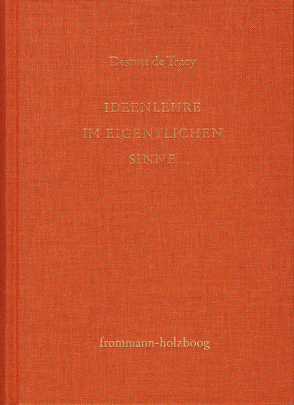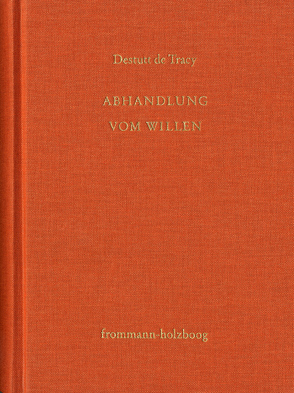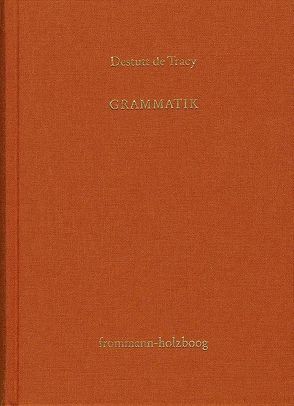The first volume of the ›Ideology‹, which was a term coined by Destutt de Tracy based on an analysis of the tradition ranging from Locke to Condillac as well as Kant, was published in 1801. This is a naturalistic epistemology, theory of language and a theory of semiotics based on the physiology of the human organs and the physics of movement in the body. By 1815, de Tracy had added three further volumes to his work: works on ›Grammar‹ and ›Logic‹ as well as his social theory. His 'Eléments d’idéologie,' presented here in a German translation for the first time, contain the key phrase: »Thinking is always feeling, nothing but feeling.« Denounced by Napoleon as political »ideology,« it continues to be worthwhile reading today as an interesting alternative to German idealism and its epistemological theories.
Aktualisiert: 2020-07-23
> findR *
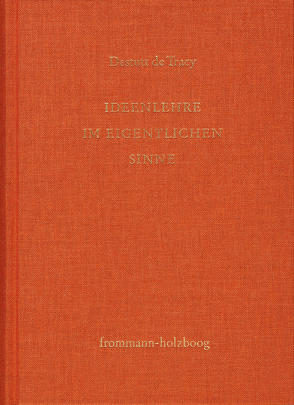
In Auseinandersetzung mit der Tradition von Locke bis Condillac sowie Kant erschien 1801 der erste Band der von Destutt de Tracy begründeten ›Idéologie‹. Es handelt sich um eine auf die Physiologie der menschlichen Organe und die Physik der Körperbewegungen gestützte naturalistische Erkenntnis-, Sprach- und Zeichentheorie. Bis 1815 ergänzte de Tracy sein Werk um drei weitere Bände: seine ››Grammatik‹ und ›Logik‹ sowie seine Gesellschaftstheorie. Die hier erstmals in deutscher Übersetzung erscheinenden ›Grundzüge einer Ideenlehre‹ entfalten den Kernsatz: »Denken ist immer Empfinden, nichts als Empfinden.« Von Napoleon politisch als »Ideologie« denunziert, verspricht sie als interessante Alternative zum Deutschen Idealismus und dessen Erkenntnislehren noch heute eine fruchtbare Lektüre.
The first volume of the ›Ideology‹, which was a term coined by Destutt de Tracy based on an analysis of the tradition ranging from Locke to Condillac as well as Kant, was published in 1801. This is a naturalistic epistemology, theory of language and a theory of semiotics based on the physiology of the human organs and the physics of movement in the body. By 1815, de Tracy had added three further volumes to his work: works on ›Grammar‹ and ›Logic‹ as well as his social theory. His 'Eléments d’idéologie,' presented here in a German translation for the first time, contain the key phrase: »Thinking is always feeling, nothing but feeling.« Denounced by Napoleon as political »ideology,« it continues to be worthwhile reading today as an interesting alternative to German idealism and its epistemological theories.
Aktualisiert: 2020-07-14
> findR *
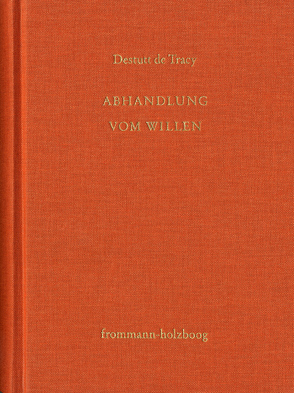
Destutt de Tracys bereits 1805 am Ende seiner Logik angekündigte ›Abhandlung vom Willen und von dessen Wirkungen‹ ist 1815 als zweite Abteilung der ›Grundzüge einer Ideenlehre‹ erschienen. In einem Band zusammengestellt sind ein Nachtrag zur ersten Abteilung, der der praktischen Philosophie und Gesellschaftstheorie gewidmete vierte Teil der ›Grundzüge‹ und deren unvollendeter fünfter Teil über die Leidenschaften, über die Moral und die Liebe. 1823 erhielt dieser Band den Titel ›Traité d’économie politique‹; dies entsprach der von Thomas Jefferson betreuten amerikanischen Übersetzung, die 1818 als ›Treatise on Political Economy‹ erschienen war. Die wichtigsten Gegenstände der ›Abhandlung vom Willen‹ sind die aus der Fähigkeit zu wollen hervorgehenden Ideen der Persönlichkeit, der menschlichen Bedürfnisse und Mittel, des Reichtums und der Entbehrung, der Freiheit und des Zwangs, der Rechte und Pflichten sowie unter dem Stichwort »Ökonomie« die Gesellschaftstheorie.
Destutt de Tracy’s ›Treatise on the Will and its Effects‹, which he announced in 1805 after finishing the ›Logic,‹ was published in 1815 as the second section of the 'Eléments d’idéologie'. An addendum to the first section, the fourth part of the 'Eléments d’idéologie’ dealing with practical philosophy and social theory and the unfinished fifth part on passion, morality and love are compiled in one volume. In 1823, this volume was given the title 'Traité d’économie politique', which was consistent with the American translation by Thomas Jefferson, published in 1818 as ›Treatise on Political Economy‹. The main subjects of the ›Treatise on the Will‹ are the ideas of personality, human needs and means, wealth and deprivation, liberty and constraint, rights and obligations which arise from faculty of willing. This work also deals with social theory under the heading of »economy.«
Aktualisiert: 2020-07-07
> findR *
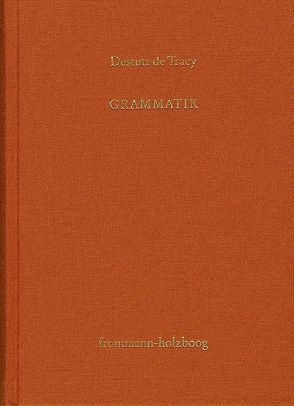
Als zweiten Band der von ihm begründeten ›Idéologie‹ veröffentlichte Destutt
de Tracy 1803 seine Grammatik als »Wissenschaft der Zeichen«; sie
signalisiert den Übergang von der Sprachwissenschaft zur Semiotik. In kritischer
Auseinandersetzung mit den bedeutendsten Grammatikern seiner
Zeit plädiert er in seiner analytischen Theorie aller Elemente der Proposition
und der Syntax gegen Hieroglyphen- und Symbolschriften und für eine
allgemeinverbindliche »philosophische« Universalschrift, zugleich aber
auch gegen eine Universalsprache, die – auf die Gelehrten konzentriert –
der Aufklärung des Volkes schaden müsste.
Constituting the second volume of the Idéologie that he founded in 1803, Destutt de Tracy published his Grammar as a »science of signs«; it marks the transition from linguistics to semiotics. In a critical debate with the leading grammarians of his time, his analytic theory of all elements of proposition and syntax argues against hieroglyphic and symbolic scripts, and for a generally applicable ›philosophical‹ universal language, and is also opposed to a universal language solely for scholars that would be detrimental to the enlightenment of the people.
Aktualisiert: 2021-01-18
> findR *
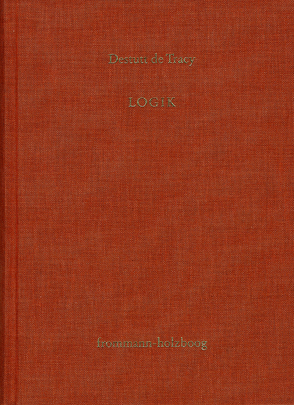
1805 erschien als dritter Band der ›Grundzüge einer Ideenlehre‹ Destutt de Tracys Logik. Den wesentlichen Unterschied zum ersten Band bildet die ausführlich behandelte Geschichte der logischen Ideen. Zu den für ihn bedeutendsten Vorläufern – Aristoteles, Bacon, den »Herren von Port-Royal«, Descartes, Locke, Hobbes, Condillac und Buffier – äußert er scharfe Kritik in der Perspektive seiner sensualistisch-naturalistischen Ideenlehre, vor allem an der aristotelischen Syllogistik und an der deutschen Tradition des Apriorismus. Bisher sei die Logik als ›»Kunst, vernünftig zu denken« missverstanden worden. Sie müsse zur »ersten Wissenschaft« werden und allein in der Analyse der Bildung und Deduktion unserer Ideen bestehen; so erst garantiere die Logik die Erkenntnis der Eigenarten von Wahrheit und Gewissheit sowie der Ursachen von Ungewissheit und Irrtum. Insgesamt ist diese Logik, die zugleich ein autobiografischer Bericht über den Weg zur Ideenlehre ist, ein Plädoyer gegen Skeptizismus.
In 1805, Destutt de Tracy's ›Logic‹ was published as volume three of his ›Eléments d'idéologie‹. The fundamental difference between this volume and the first volume was the detailed discussion on the history of logical ideas. He was scathingly critical of those precursors who in his opinion were the most significant – Aristoteles, Bacon, the »men of Port-Royal«, Descartes, Locke, Hobbes, Condillac and Buffier – from the perspective of his sensualistic-naturalistic ideology, and above all of Aristotelian syllogistic and the German tradition of apriorism. Previously logic had been misunderstood as »the art of reasonable thinking«. He believed it should become the »first science« and should consist solely of the analysis of the development and deduction of our ideas. It is only in this way that logic can guarantee the recognition of the characteristics of truth and certainty as well as of the causes of uncertainty and error. On the whole, this logic, which is at the same time an autobiographical account of the path to ideology, is a plea against skepticism.
Aktualisiert: 2021-01-18
> findR *
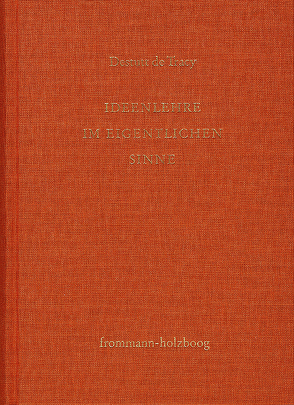
Der erste Band der ›Grundzüge einer Ideenlehre‹ enthält Destutt de Tracys
naturalisierte »Wissenschaft der Ideen«. Seine Ausgangsfrage lautet: Was ist Denken? Beantwortet wird sie mit einer systematischen Theorie des Empfindungsvermögens, des Gedächtnisses, des Urteils, des Willens, der Zeit und der menschlichen Existenz. Seine Positionen erarbeitet Destutt de Tracy in Auseinandersetzung mit dem Sensualismus Condillacs und in Kritik an Kant. Die intellektuellen Fähigkeiten, deren Grundlage die Sinnesempfindungen sind, und ihre Vervollkommnung werden aus den Eigenschaften der Körper und der Bewegungen sowie aus der Wirkung häufiger Wiederholung derselben Handlungen im Kontext von Sprache und Zeichen abgeleitet. Dies führte zum Konflikt mit den kirchlichen und staatlichen Autoritäten; nach 1803 begann Napoleon, die als ›Ideologen‹ denunzierten Vertreter der Ideenlehre zu bekämpfen.
The first volume of the 'Eléments d’idéologie’ contains Destutt de Tracy’s naturalized »Science des Idées«. His opening question is: What is thinking? The question is answered with a systematic theory of sensibility, memory, judgment, will, time and human existence. Destutt de Tracy developed his position by studying Condillac’s sensualism and in a critique of Kant. Intellectual capacities, which are based on sensations, and their perfection, are derived from the properties of bodies and movements as well as from the impact of frequent repetition of the same actions in the context of language and signs. This led to a conflict with the church and state authorities. After 1803 Napoleon began his battle against de Tracy, whom he denounced as an »ideologue«.
Aktualisiert: 2020-08-04
> findR *
Destutt de Tracy’s ›Treatise on the Will and its Effects‹, which he announced in 1805 after finishing the ›Logic,‹ was published in 1815 as the second section of the 'Eléments d’idéologie'. An addendum to the first section, the fourth part of the 'Eléments d’idéologie’ dealing with practical philosophy and social theory and the unfinished fifth part on passion, morality and love are compiled in one volume. In 1823, this volume was given the title 'Traité d’économie politique', which was consistent with the American translation by Thomas Jefferson, published in 1818 as ›Treatise on Political Economy‹. The main subjects of the ›Treatise on the Will‹ are the ideas of personality, human needs and means, wealth and deprivation, liberty and constraint, rights and obligations which arise from faculty of willing. This work also deals with social theory under the heading of »economy.«
Aktualisiert: 2020-08-20
> findR *
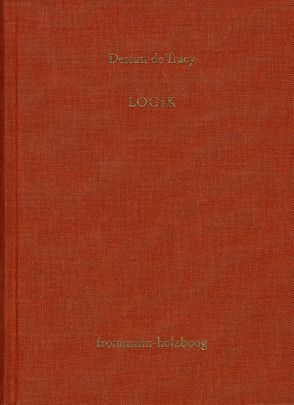
In 1805, Destutt de Tracy's ›Logic‹ was published as volume three of his ›Eléments d'idéologie‹. The fundamental difference between this volume and the first volume was the detailed discussion on the history of logical ideas. He was scathingly critical of those precursors who in his opinion were the most significant – Aristoteles, Bacon, the »men of Port-Royal«, Descartes, Locke, Hobbes, Condillac and Buffier – from the perspective of his sensualistic-naturalistic ideology, and above all of Aristotelian syllogistic and the German tradition of apriorism. Previously logic had been misunderstood as »the art of reasonable thinking«. He believed it should become the »first science« and should consist solely of the analysis of the development and deduction of our ideas. It is only in this way that logic can guarantee the recognition of the characteristics of truth and certainty as well as of the causes of uncertainty and error. On the whole, this logic, which is at the same time an autobiographical account of the path to ideology, is a plea against skepticism.
Aktualisiert: 2019-01-08
> findR *
Constituting the second volume of the Idéologie that he founded in 1803, Destutt de Tracy published his Grammar as a »science of signs«; it marks the transition from linguistics to semiotics. In a critical debate with the leading grammarians of his time, his analytic theory of all elements of proposition and syntax argues against hieroglyphic and symbolic scripts, and for a generally applicable ›philosophical‹ universal language, and is also opposed to a universal language solely for scholars that would be detrimental to the enlightenment of the people.
Aktualisiert: 2019-01-08
> findR *
The first volume of the ›Eléments d'idéologie‹ contains Destutt de Tracy's naturalized »Science des Idées«. His opening question is: What is thinking? The question is answered with a systematic theory of sensibility, memory, judgment, will, time and human existence. Destutt de Tracy developed his position by studying Condillac's sensualism and in a critique of Kant. Intellectual capacities, which are based on sensations, and their perfection, are derived from the properties of bodies and movements as well as from the impact of frequent repetition of the same actions in the context of language and signs. This led to a conflict with the church and state authorities. After 1803 Napoleon began his battle against de Tracy, whom he denounced as an »ideologue«.
Aktualisiert: 2019-01-08
> findR *
MEHR ANZEIGEN
Bücher von Destutt de Tracy, Antoine Louis Claude
Sie suchen ein Buch oder Publikation vonDestutt de Tracy, Antoine Louis Claude ? Bei Buch findr finden Sie alle Bücher Destutt de Tracy, Antoine Louis Claude.
Entdecken Sie neue Bücher oder Klassiker für Sie selbst oder zum Verschenken. Buch findr hat zahlreiche Bücher
von Destutt de Tracy, Antoine Louis Claude im Sortiment. Nehmen Sie sich Zeit zum Stöbern und finden Sie das passende Buch oder die
Publiketion für Ihr Lesevergnügen oder Ihr Interessensgebiet. Stöbern Sie durch unser Angebot und finden Sie aus
unserer großen Auswahl das Buch, das Ihnen zusagt. Bei Buch findr finden Sie Romane, Ratgeber, wissenschaftliche und
populärwissenschaftliche Bücher uvm. Bestellen Sie Ihr Buch zu Ihrem Thema einfach online und lassen Sie es sich
bequem nach Hause schicken. Wir wünschen Ihnen schöne und entspannte Lesemomente mit Ihrem Buch
von Destutt de Tracy, Antoine Louis Claude .
Destutt de Tracy, Antoine Louis Claude - Große Auswahl an Publikationen bei Buch findr
Bei uns finden Sie Bücher aller beliebter Autoren, Neuerscheinungen, Bestseller genauso wie alte Schätze. Bücher
von Destutt de Tracy, Antoine Louis Claude die Ihre Fantasie anregen und Bücher, die Sie weiterbilden und Ihnen wissenschaftliche Fakten
vermitteln. Ganz nach Ihrem Geschmack ist das passende Buch für Sie dabei. Finden Sie eine große Auswahl Bücher
verschiedenster Genres, Verlage, Schlagworte Genre bei Buchfindr:
Unser Repertoire umfasst Bücher von
Sie haben viele Möglichkeiten bei Buch findr die passenden Bücher für Ihr Lesevergnügen zu entdecken. Nutzen Sie
unsere Suchfunktionen, um zu stöbern und für Sie interessante Bücher in den unterschiedlichen Genres und Kategorien
zu finden. Neben Büchern von Destutt de Tracy, Antoine Louis Claude und Büchern aus verschiedenen Kategorien finden Sie schnell und
einfach auch eine Auflistung thematisch passender Publikationen. Probieren Sie es aus, legen Sie jetzt los! Ihrem
Lesevergnügen steht nichts im Wege. Nutzen Sie die Vorteile Ihre Bücher online zu kaufen und bekommen Sie die
bestellten Bücher schnell und bequem zugestellt. Nehmen Sie sich die Zeit, online die Bücher Ihrer Wahl anzulesen,
Buchempfehlungen und Rezensionen zu studieren, Informationen zu Autoren zu lesen. Viel Spaß beim Lesen wünscht Ihnen
das Team von Buchfindr.
